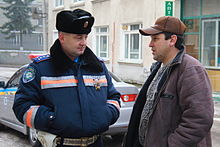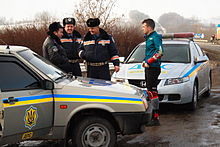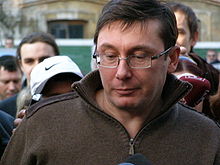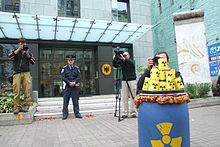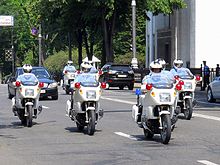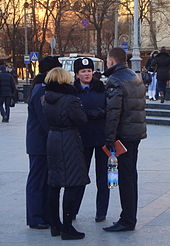- Ministry of Internal Affairs (Ukraine)
-
This article is about the police authority of Ukraine. For the description of policing methods common to post-Soviet states, see Militsiya.
Ministry of Internal Affairs (Ukraine) Міністерство внутрішніх справ України
(Мiлiцiя України)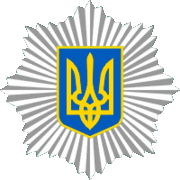
Agency overview Preceding agency Ministry of Internal Affairs of the Ukrainian Soviet Socialist Republic Headquarters vul. Akademika Bohomol'tsya 10, Kiev Employees 220,000 Website Official English Page Map 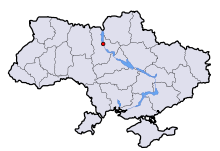
The Ministry of Internal Affairs of Ukraine (Ukrainian: Міністерство внутрішніх справ України, Ministerstvo vnutrishnikh sprav Ukrayiny, MVS) is the main body in the system of central bodies of exeecutive power that provides formation and realization of the state policy in the sphere of protection the rights and liberties of citizens, unlawful acts against the interest of society and state, fight against crime, providing a civil order, ensuring a ccivil security, traffic safety, security and protection of very important persons. It is a centralised agency headed by a Minister of Internal Affairs.
The generic term for the Ukrainian police (and for police in most of the post-Soviet countries) is militsiya.
According to Amnesty International torture and ill-treatment by the militia is widespread in Ukraine.[1] Several militia officers have been arrested for allegedly torturing detainees.[2]
Contents
Terminology
The force's name, мiлiцiя, translates roughly into the English language as 'Police', however this is often rendered in English as 'Militsiya' in order to match the original Ukrainian. The force's full name is the same as that of the ministry with which it is linked, Міністерство внутрішніх справ України which translated as 'Ministry of Internal Affairs of Ukraine', however, the full official title of the force is rarely used in speech. On occasion the initials МВС (MVS) may be used to refer to the force.
An individual officer is typically called a мiлiцiонер (militsiyoner) (plural мiлiцiонери) (militsiyonery); these are not, however, official titles and are not included in the official rank structure, they are simply terms used to refer to any militsiya officer regardless of the rank they may hold. A police station is known as відділення міліції (viddilennya militsyii) which translates more or less into English as 'police department'. The term Управління МВС (Upravlinnya MVS) refers to a regional or national police command post.
On the whole, officers' individual ranks are not used by the general public and thus when addressing an officer, it is common to hear the term Пан (female - Пані), Ukrainian for mister/miss used to refer to police officers. On occasion, this may or may not be followed by the term Офіцер (Ofitser).
Transportation
The Ukrainian militsiya uses a number of different models of automobile which range greatly in age and technical specification.
Current patrol fleet
Patrol Cars
Vans
All Terrain Vehicles
Ministers of Internal Affairs of Ukraine
See also: List of former interior ministers of UkraineThe Ministry of Internal Affairs is headed by a minister who is also, incidentally, recognised as head of the national (state) police service, the militsiya. As a result of this system, many former ministers have previously had experience of serving in the police, and many were, prior to taking up their posts, generals of the militsiya. Typically the minister of internal affairs afforded the rank of Colonel General of Militsiya upon taking up his post in the Ukrainian Cabinet. To this date Yuriy Lutsenko and Vasyl Tsushko are the only former holders of the office who had never served in any of the Ukrainian or, earlier, Soviet law enforcement agencies.
List of Ministers of Internal Affairs of Ukraine Name From Until President Notes Andriy Vasylyshyn August 24, 1991 July 21, 1994 Leonid Kravchuk First post-independence minister Volodymyr Radchenko July 28, 1994 July 3, 1995 Leonid Kuchma Acting July 21-28, 1994 Yuriy Kravchenko July 3, 1995 March 26, 2001 Leonid Kuchma Involved in 'Eagles of Kravchenko' case Yuriy Smirnov March 26, 2001 August 27, 2003 Leonid Kuchma Mykola Bilokin August 27, 2003 February 3, 2005 Leonid Kuchma Yuriy Lutsenko February 4, 2005 December 1, 2006 Viktor Yushchenko First civilian minister Vasyl Tsushko December 1, 2006 December 18, 2007 Viktor Yushchenko First minister never directly subordinate to the president Yuriy Lutsenko December 18, 2007 January 28, 2010 Viktor Yushchenko Acting January 28-March 11, 2010 Anatoliy Mohyliov March 11, 2010 November 7, 2011[3] Viktor Yanukovich First post-Orange revolution minister Vitaliy Zakharchenko November 7, 2011[4] Viktor Yanukovich Former head of the State Tax Service of Ukraine[4] The minister of Internal Affairs is responsible directly to the Prime Minister of Ukraine, to the Ukrainian Parliament (Verkhovna Rada) and ultimately the President of Ukraine. His office is located in Kiev's Pechersk District.
Rank structure
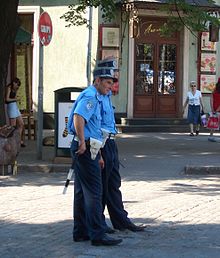 Two officers of the 'ДАI', (Militsiya traffic corps) at work in Odessa. Note: the french-style kepi worn by the officers is part of the traditional summer uniform for the Militsiya in some of Ukraine's southern oblasts.
Two officers of the 'ДАI', (Militsiya traffic corps) at work in Odessa. Note: the french-style kepi worn by the officers is part of the traditional summer uniform for the Militsiya in some of Ukraine's southern oblasts.
Cadet Officers Private Officers Non-commissioned Officers Shoulder insignia
for every day uniform








Rank Cadet
of militsiyaPrivate
of militsiyaCorporal
of militsiyaJunior sergeant
of militsiyaSergeant
of militsiyaSenior sergeant
of militsiyaStarshina
of militsiyaPraporshchik
of militsiyaSenior praporshchik
of militsiyaStructure
Ministry has 30 departments and three agencies that are subordinated to it. Minister has up to eight deputies (other than his first deputy) that head the main departments of the ministry.
The following is the list of the main departments of the Ministry. In bold are identified departments headeed by ministry deputy.
Departments of the Militsiya
The Following are constituent departments of the militsiya:
- Leadership (consisting of the minister and his first deputy)
- Office of Ministry (Department in monitoring of human rights in activities of OVS)
- Advisers to the MVS
- Deputy Minister - Chief of HUBOZ
- Chief Department in the fight against the organized crime (HUBOZ)
- Internal Security Service of HUBOZ
- Working office of the Ukrainian Bureau of Interpol (special department, formerly part of Criminal Militsiya)
- Deputy Minister - Chief of Criminal Militsiya (consists of at least nine subordinated departments)
- Deputy Minister - Chief of Militsiya of Civil Security
- Department of Civil Security
- Department of the State Auto Inspection (DAI)
- Department of Veterinary Militsiya in conducting quarantine in veterinary events
- Department of State Security Service (formerly part of Militsiya of civil security, it's currently a separate department)
- Department of transportation militsiya
- Deputy Minister - Chief of HSU
- Chief Detection Department
- Department of Investigation (Inquiry)
- State Science-Research Expert-Criminal Center
- Deputy Minister - Chief of Staff (several independent departments and directorates which are primarily for administrative support)
- Deputy Minister
- Department of public relationship and international activity
- State Department on issues of citizenship, immigration, and registration of physical persons
- Deputy Minister
- Supporting departments
- Deputy Minister - Chief of MVS in Crimea
Service uniform sleeve insignia for uniformed officers Branch Criminal Traffic Public Order State Security Service Berkut Insignia 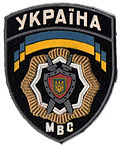
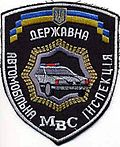

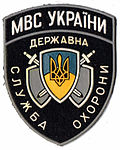
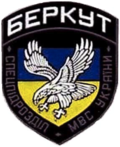
Other departments of the ministry
There are a number of other departments of the Ministry of Internal Affairs which are not directly related to the ministry's role as a civilian law enforcement agency. These are:
- GUVV - Chief Directorate of Internal Troops (special militarized department)
- Control-revisionary directorate
- Sub-Department of special communication
- Department of documentary service and scheduling
There are also three independent supporting agencies:
- State scientific-researching institute and higher educational institutions (supporting the Chief of Staff)
Educational institutions of the Ministry
Each university and institute often also has its own base program
- Academy of Management
- Kiev National University of Interior
- Kharkiv National University of Interior
- Kirovohrad campus (Legal institute)
- Kherson campus (Legal institute)
- Sumy city affiliation
- Dnipropetrovsk State University of Interior
- Zaporizhia campus (Legal institute)
- Kryvyi Rih department
- Zaporizhia campus (Legal institute)
- Luhansk State University of Interior of Didorenko
- Donetsk campus (Legal institute) contains a scientifically-researching center of psycho-training technologies
- Lviv State University of Interior
- Prykarpattya campus (Legal institute)
- Odessa State University of Interior
- Crimea campus (Legal institute)
Deployment outside Ukraine
Deployments in various UN missions as of November 2009:
 Democratic Republic of the Congo: (MONUC) - 3 Individual Police[5]
Democratic Republic of the Congo: (MONUC) - 3 Individual Police[5] : (UNFICYP) - 1 Individual Police[5]
: (UNFICYP) - 1 Individual Police[5] Kosovo: (UNMIK) - 1 Individual Police[5]
Kosovo: (UNMIK) - 1 Individual Police[5] Liberia: (UNMIL) - 19 Individual Police[5]
Liberia: (UNMIL) - 19 Individual Police[5] Sudan: (UNMIS) - 19 Individual Police[5]
Sudan: (UNMIS) - 19 Individual Police[5] East Timor: (UNMIT) - 10 Individual Police[5]
East Timor: (UNMIT) - 10 Individual Police[5] Côte d'Ivoire: (UNOCI) - 4 Individual Police[5]
Côte d'Ivoire: (UNOCI) - 4 Individual Police[5]
Notes and references
- ^ Ukraine: Victims of police brutality, Amnesty International USA (September 27, 2005)
- ^ Ukrainian Police Arrested For Alleged Torture, Radio Free Europe/Radio Liberty (April 1, 2010)
- ^ Yanukovych appoints Mohyliov to Crimean post, Kyiv Post (7 November 2011)
- ^ a b Chief tax officer Zakharchenko appointed interior minister of Ukraine, Kyiv Post (7 November 2011)
- ^ a b c d e f g UN Mission's Contributions by Country for November 2009
Further reading
- Full collection of laws of the Russian Empire since 1649. Vol.5. Saint Petersburg, 1830. page 13. (Полное собрание законов Российской империи с 1649 г. - Спб., 1830. - Т. 5. - С. 13)
See also
- Berkut (Ukrainian police)
- Prosecutor General of Ukraine
- Security Service of Ukraine
- Internal Troops of Ukraine
Other references
- How Top Spies in Ukraine Changed the Nation's Path by K.J.Chivers of the New York Times
- How the Gongadze Case Has Been Investigated (June 2005 Ukrayinska Pravda article on the history of the Gongadze Case investigation) (Ukrainian)
- The Key Witness in the Gongadze Case Dead (March 2005 Ukrayinska Pravda article on the death of Kravchenko, analysing also his role in the Gongadze case - includes fragments of the Melnychenko recordings) (Ukrainian)
External links
- Official website of the Ministry of Internal Affairs of Ukraine (Ukrainian)
- Overview of MVS' special units (Russian)
MVS (Internal Troops · GUBOZ · Criminal Militsiya · Main Detection Directory · Militsiya of Public Security)Security Security Service · Directory of State Security · State Border Guard Service (Sea Guard) · Tax MilitsiyaAgrarian Policy · Economic Development and Trade · Infrastructure · Culture · Defence · Education and Science, Youth and Sport · Social Policy · Energy and Coal Mining · Ecology and Natural Resources · Finance · Foreign Affairs
Health Security · Internal Affairs · Justice · Regional Development, Construction, and Communal Living · EmergenciesOffice of Cabinet of Ministers (National Agency of the State Service) · Office of Prime MinisterLaw enforcement in Europe Sovereign
states- Albania
- Andorra
- Armenia
- Austria
- Azerbaijan
- Belarus
- Belgium
- Bosnia and Herzegovina
- Bulgaria
- Croatia
- Cyprus
- Czech Republic
- Denmark
- Estonia
- Finland
- France
- Georgia
- Germany
- Greece
- Hungary
- Iceland
- Ireland
- Italy
- Kazakhstan
- Latvia
- Liechtenstein
- Lithuania
- Luxembourg
- Macedonia
- Malta
- Moldova
- Monaco
- Montenegro
- Netherlands
- Norway
- Poland
- Portugal
- Romania
- Russia
- San Marino
- Serbia
- Slovakia
- Slovenia
- Spain
- Sweden
- Switzerland
- Turkey
- Ukraine
- United Kingdom
- (England
- Northern Ireland
- Scotland
- Wales)
- Vatican City
States with limited
recognition- Abkhazia
- Kosovo
- Nagorno-Karabakh
- Northern Cyprus
- South Ossetia
- Transnistria
Dependencies
and other territories- Åland
- Faroe Islands
- Gibraltar
- Guernsey
- Jan Mayen
- Jersey
- Isle of Man
- Svalbard
Other entities - European Union
Categories:- Law enforcement in Ukraine
- Government ministries of Ukraine
Wikimedia Foundation. 2010.

